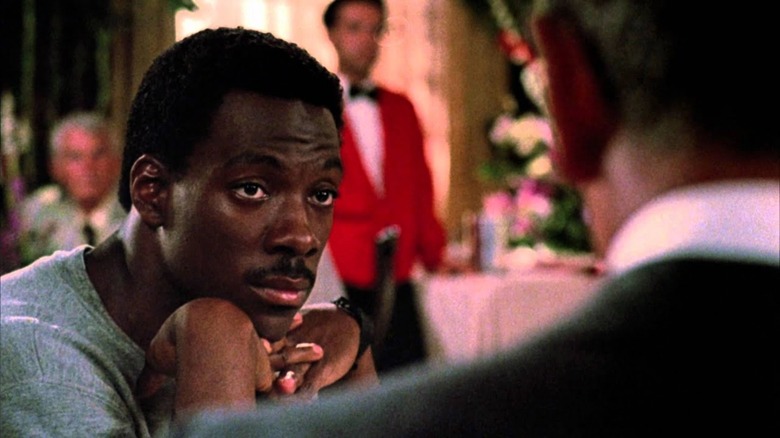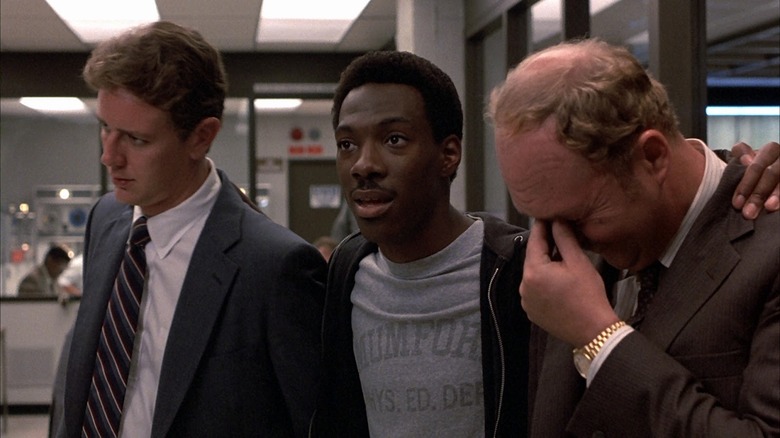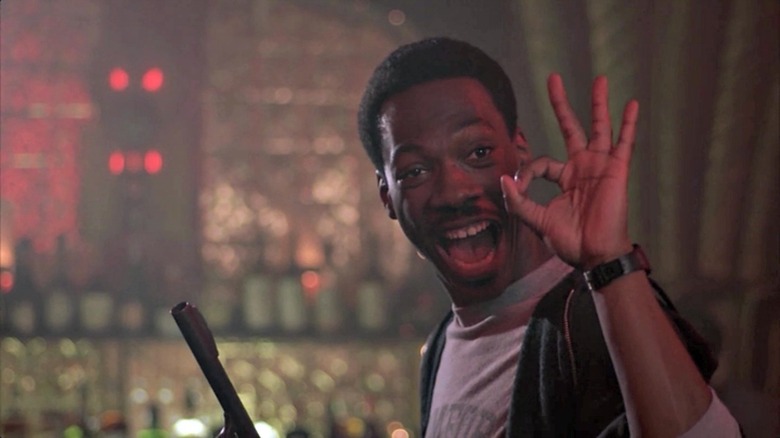The Decision To Direct Beverly Hills Cop Came Down To A Literal Coin Flip
Watching it in 2023, one might find themselves a little baffled as to why Martin Brest's 1984 crime comedy "Beverly Hills Cop" was such a massive success. Made for a modest $13 million, "Beverly Hills Cop" caused a sensation, earning over $234 million domestically which is, when adjusted for inflation, closer to $700 million. It made Eddie Murphy a household name and more or less codified an emerging genre of R-rated buddy cop movies that would remain ascendant throughout the 1980s and into the 1990s (Walter Hill's 1982 film "48 Hrs.," also starring Murphy, would be another notable hit in this regard). The success of "Beverly Hills Cop" might confuse people, however, as it seems wildly basic these days. The jokes are not particularly funny, and while Murphy is as charismatic as they come, his Snobs vs. Slobs shtick seems trite and tired.
It seems that "Beverly Hills Cop," however, was merely outstripped by its imitators. In the wave of imitators that spawned, filmmakers pushed the action and the humor to higher and higher degrees, making the original look small and trite by comparison. Fast-forward to 1989's "Lethal Weapon 2," and one can see how enormous — in terms of action content — the genre became in just a few short years.
In a recent interview with Variety, Brest talked to Todd Gilchrist about his long career as a director, and reminisced on his days working on "Beverly Hills Cop." It seems that Brest was at a low point in his career, and decided to make the comedy film by flipping a coin. It came up heads.
Axel Foley
"Beverly Hills Cop" was clearly a vehicle for the comedy styling of Eddie Murphy, so it may come as a shock to learn that the role of Axel Foley was originally intended to go to Sylvester Stallone. The story of "Beverly Hills Cop," by the way, is about a Detroit cop (Murphy) who claims to be taking a vacation to Beverly Hills, but who is instead investigating the death of a friend. Axel is flip, down-to-earth, and bemused by the "soft" yuppie culture he encounters in L.A.
When asked about the origins of "Beverly Hills Cop," Brest recalls that he had just lost a high-profile job and was in a funk:
"I was fired off 'WarGames,' and I went through a very dark personal period. I felt my nascent career was over. And Don Simpson and Jerry Bruckheimer wanted me to do this movie starring Sylvester Stallone. For some reason, while no one else in the business would recognize me at all, they really pursued me. And I still turned it down. But because they really kept badgering me, I said, 'I'm going to flip a coin.' I flipped the coin and it was heads and I was terrified, but I committed to doing it with Sylvester Stallone as the Axel character."
"WarGames" came out in 1983, incidentally, and was credited to John Badham. Brest, as he revealed in a biography, shot "WarGames" for 12 days before having a beef with the producers and getting fired. Brest wanted a darker, more sinister movie. Badham claims to be the one to have brightened the movie and made the teenage leads more affable. In other words, he did with "WarGames" what Brest did with "Beverly Hills Cop."
The first draft
It seems that the original conception of "Beverly Hills Cop" was dark action more than the fish-out-of-water comedy it became. Indeed, the original screenplay, written by Stallone, was eventually repurposed into a different movie entirely. Instead, Daniel Petrie, Jr. ("The Big Easy," "Turner & Hooch," "Combat Hospital") rewrote the film to accommodate Murphy, who was a surprisingly late addition to the pre-production. In Brest's words:
"My conception of it at the time was to do something with Stallone that nobody had ever seen before. It had some comedic elements by virtue of the fish out of water, but he wrote this thing that was a straight-out action drama. That's not what the studio really was looking to do, so he went off and he took that script and it became 'Cobra.' So we wound up getting Eddie Murphy a few weeks before shooting."
"Cobra" was the umpteenth "Dirty Harry" knockoff about a gruff cop who doesn't play by the rules. The film was directed by George P. Cosmatos ("Rambo: First Blood Part II," "Tombstone"). It wasn't a huge hit. "Beverly Hills Cop," meanwhile, was altered on the fly to match Murphy's talents as a comedian. Brest said:
"The nature of Eddie's talent and the theme that I would like to bring up and the tone that I would love to make this movie about, it was perfect. And we restructured the whole story in a couple of weeks, and went into production with basically an outline, writing as we went."
The magical alchemy worked, and Brest's film took the world by storm. Murphy was a sensation. Brest would go on to make "Midnight Run" and "Scent of a Woman." After his widely razzed "Gigli," however, he's been taking a break.


